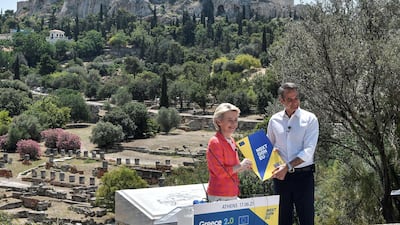The European Commission has backed Greece's post-Covid recovery plan, which includes proposals to improve connectivity for hundreds of Greek islands, with more than €30 billion ($35.83bn) in grants and loans.
Over the next five years €17.8bn in grants and €12.7bn in loans will be disbursed to Greece via the EU's Recovery and Resilience Facility.
That includes €645 million to upgrade Greece’s electricity infrastructure and improve connectivity for the Aegean Islands.
Another €1.3bn will be put towards the renovation of 100,000 residences in Greece to bolster their energy efficiency.
European Commission chief Ursula von der Leyen described Greece's plan as ambitious and said that it "will help build a better future for the Greek people. It can reshape Greece for decades ahead".
Greek Prime Minister Kyriakos Mitsotakis said that it was a plan “for everyone”.
“It’s not just a plan for a few, it’s not just a plan for a few businesses. It’s a transformative initiative that will change the way we produce, the way we live and will eventually aim at improving [the] lives of every Greek citizen,” he said in Athens.
“Today marks the last act of the turbulence the pandemic brought and the start of the recovery plan.”
Valdis Dombrovskis, the EU’s trade commissioner, said Greece’s plan included “support for energy efficient renovations and clean urban transport, as well as a focus on improving the population's digital skills, both in terms of education and in terms of reskilling and upskilling the workforce”.
The Recovery and Resilience Facility is the EU's flagship initiative to help its 27 member states recover from the pandemic.
About €672.5bn in loans and grants have been made available, with an emphasis on investments that prioritise the environment and digital transition.
The Commission's approval now has to be endorsed by EU finance ministers in July. The funding will come from money borrowed by the Commission on the financial markets.
So far, 23 of the EU’s 27 countries have submitted their spending plans. The proposals by Portugal and Spain have already been approved.










